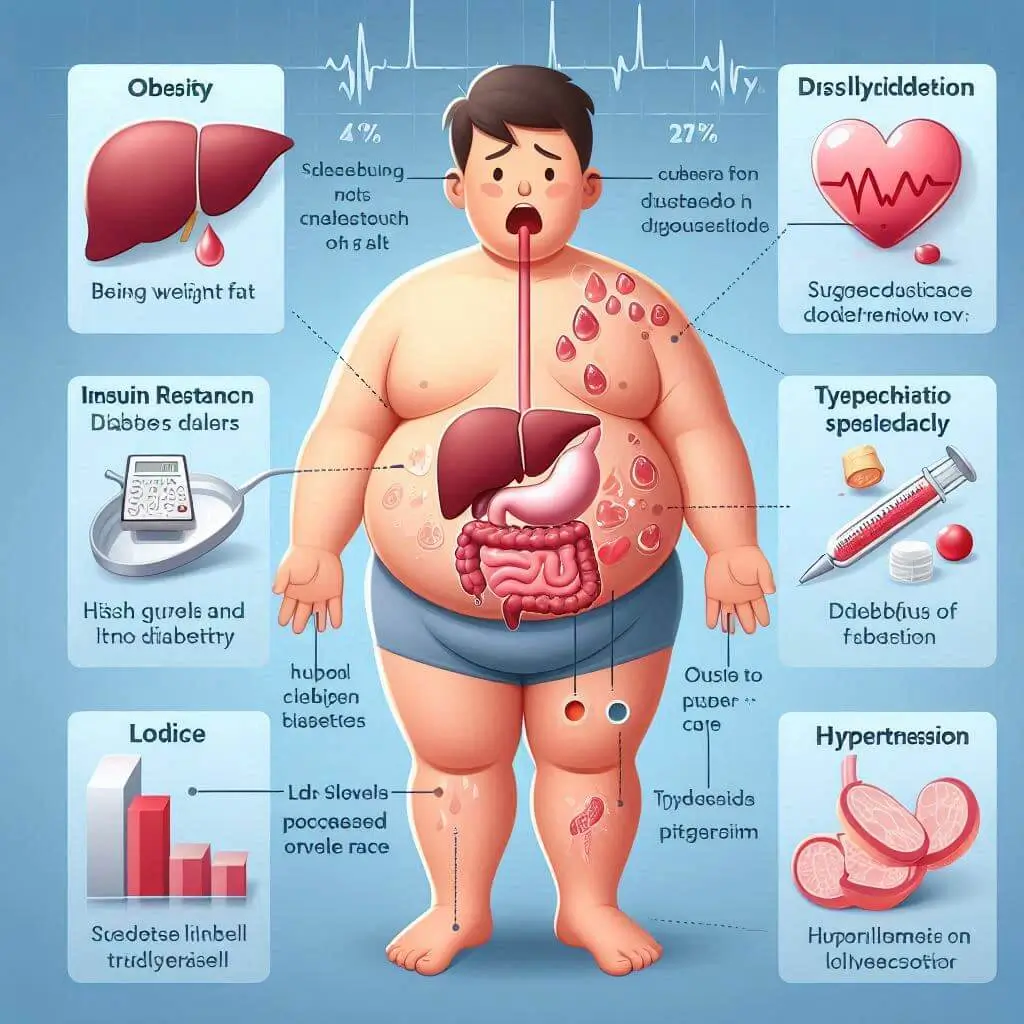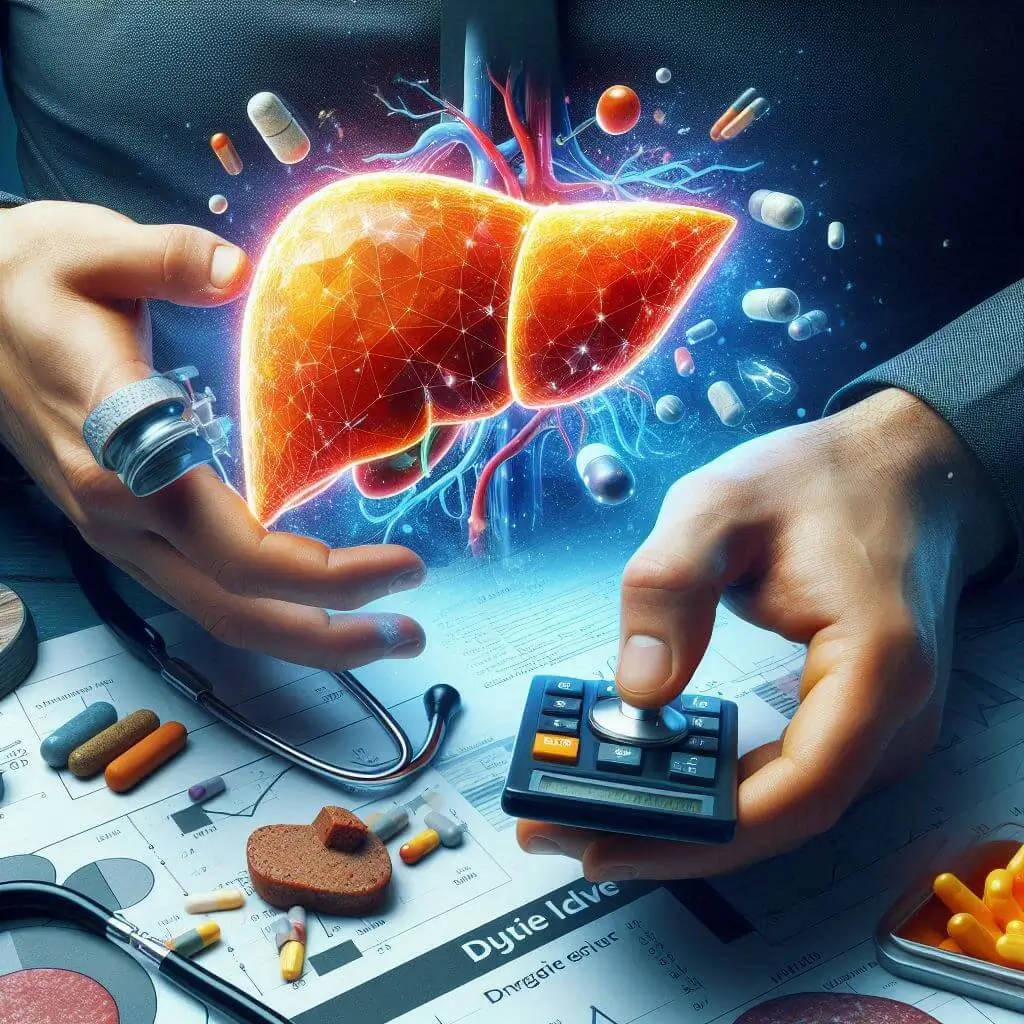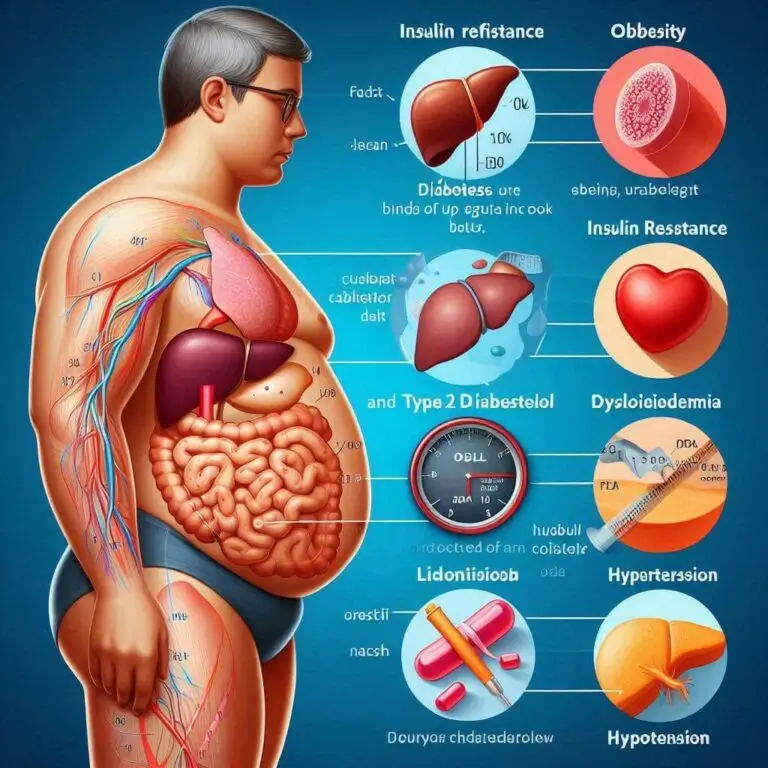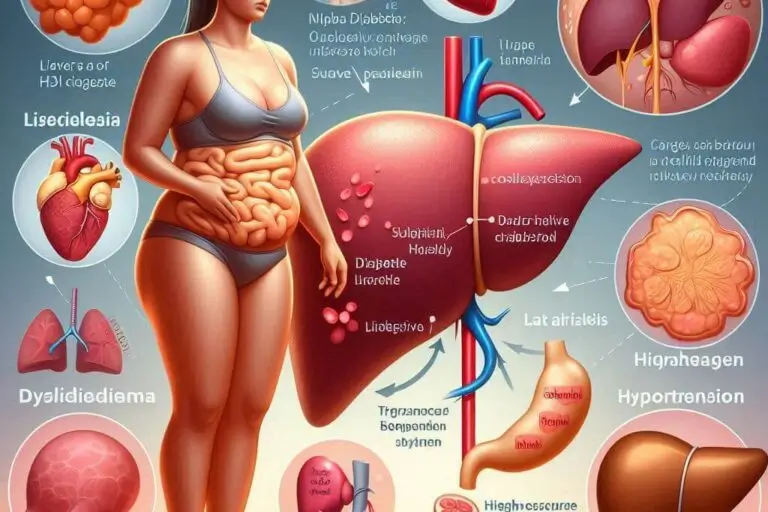The liver, a vital and complex organ, plays a crucial role in maintaining human health. Located in the upper right part of the abdomen, it is responsible for a number of essential functions, including:
- Metabolism: It processes nutrients from food, converting them into energy and components necessary for cell growth and repair.
- Detoxification: Filters the blood, removing toxic substances such as alcohol, medications and chemicals.
- Bile production: This yellow-green liquid is essential for the digestion of fats, facilitating the absorption of fat-soluble vitamins.
- Storage: The liver stores glycogen (a form of glucose), vitamins, and minerals, releasing them as needed.
- Summary of proteins: Produces proteins important for blood clotting, oxygen transport and other vital functions.
When the liver accumulates an excessive amount of fat, it develops hepatic steatosis, commonly known as fatty liver. This condition, which is often silent, can develop into more serious problems if not properly managed.
Risk Factors for Fatty Liver
Several factors contribute to the development of fatty liver, including:
- Obesity: Excess weight, especially abdominal fat, is one of the main risk factors.
- Insulin resistance and type 2 diabetes: The body's inability to use insulin effectively leads to a buildup of sugar in the blood, which can be converted to fat in the liver.
- Dyslipidemia: High levels of LDL cholesterol (bad cholesterol) and triglycerides increase the risk.
- Hypertension: High blood pressure can contribute to the development of fatty liver.
- Family history: People with close relatives who have had fatty liver are more likely to develop it.
- Sedentary lifestyle: Lack of physical activity is associated with a higher risk.
- Inadequate diet: Excessive consumption of foods rich in saturated fats, sugar and empty calories can contribute to the problem.
- Excessive alcohol consumption: Alcohol is metabolized by the liver, and excessive consumption can cause liver damage.
- Certain medications: Some medications, such as corticosteroids and certain chemotherapy agents, can increase the risk of fatty liver.

Signs and symptoms
Unfortunately, fatty liver disease usually doesn’t cause any symptoms in the early stages. However, as the condition progresses, some signs may appear, such as:
- Chronic fatigue: Feeling constantly tired, even after adequate sleep.
- Abdominal pain: Discomfort or pain in the upper right region of the abdomen.
- Weight loss inexplicable: Significant weight loss for no apparent reason.
- Abdominal bloating: Accumulation of fluid in the abdominal cavity (ascites).
- Nausea and vomiting: They may occur in more advanced cases.
- Loss of appetite: Decreased interest in food.
- Jaundice: Yellowing of the skin and eyes, indicating serious liver problems.
Diagnosis
Diagnosis of fatty liver involves a combination of:
- Detailed medical history: The doctor will evaluate your symptoms, lifestyle habits and risk factors.
- Physical examination: Your doctor will examine your abdomen to check the size and texture of your liver.
- Blood tests: Blood tests may reveal elevated levels of liver enzymes, indicating inflammation or damage to the liver.
- Imaging exams: Abdominal ultrasound is the most common method for visualizing the liver and detecting fat accumulation. In some cases, a CT scan or MRI may be necessary.
Treatment and Prevention

Treatment for fatty liver disease focuses primarily on lifestyle changes and measures to prevent the progression of the disease.
- Gradual weight loss: Reducing body weight by 5% to 10% can significantly improve liver health.
- Healthy diet: Prioritize foods rich in fiber, fruits, vegetables, whole grains, lean proteins and healthy fats. recipes to complete your diet
- Regular physical activity: Incorporate exercises aerobic and muscle strengthening exercises in your daily routine.
- Blood sugar control: Maintain glucose levels within the normal range.
- Cholesterol reduction: Control LDL cholesterol levels.
- Alcohol limitation: Avoid excessive consumption of alcoholic beverages.
- Medication: In some cases, medications may be prescribed to reduce liver inflammation or control other associated health problems.
- “A placebo-controlled study of liraglutide for the treatment of nonalcoholic steatohepatitis in patients with type 2 diabetes”:
Preventing fatty liver involves adopting a healthy lifestyle, including a balanced diet, regular physical activity, maintaining a healthy weight, and controlling medical conditions such as diabetes and high blood pressure.
It is important to note that fatty liver is a serious condition that can lead to serious complications, such as cirrhosis and liver cancer. Therefore, it is essential to seek medical advice and follow the recommendations of your healthcare professional.
Want to learn more about a specific fatty liver complication or advanced treatment options?
Complications of Fatty Liver
Although fatty liver can remain silent for many years, it is essential to understand the potential risks associated with this condition.
If not treated properly, fatty liver can progress to serious complications, significantly affecting quality of life and, in some cases, leading to life-threatening conditions.

Nonalcoholic Steatohepatitis (NASH)
NASH is a more aggressive form of fatty liver disease characterized by inflammation of the liver.
This inflammation can lead to scarring of liver tissue, a process known as fibrosis.
Liver Cirrhosis
Progressive fibrosis can progress to cirrhosis, a serious condition in which liver tissue is irreversibly damaged and replaced by scar tissue.
Cirrhosis significantly compromises liver function, leading to a number of complications, including:
- Portal hypertension: Increased blood pressure in the portal vein, which carries blood from the intestine to the liver.
- Ascites: Accumulation of fluid in the abdominal cavity.
- Esophageal varices: Swollen veins in the esophagus, which can rupture and cause severe bleeding.
- Hepatic encephalopathy: Accumulation of toxic substances in the brain, leading to confusion, disorientation and behavioral changes.
- Liver failure: Complete liver failure, a potentially fatal condition.
Liver Cancer
Cirrhosis significantly increases the risk of developing liver cancer, a type of malignant tumor that originates in liver cells.
Other Complications
In addition to liver complications, fatty liver is also associated with an increased risk of:
- Cardiovascular diseases: Including heart attacks and strokes.
- Type 2 Diabetes: Insulin resistance, often present in fatty liver, can contribute to the development of diabetes.
- Chronic kidney disease: The liver and kidneys are interconnected, and damage to the liver can affect kidney function.
Advanced Treatment

For patients with advanced fatty liver or cirrhosis, treatment options may include:
- Medicines: Some medications can help reduce liver inflammation and slow the progression of the disease.
- Invasive procedures: In severe cases, procedures such as portal vein embolization or liver transplantation may be considered.
It is essential to emphasize that prevention and early treatment of fatty liver are essential to avoid serious complications. Adopting a healthy lifestyle, including a balanced diet, regular physical activity and weight control, is crucial to protecting liver health.
Want to learn more about non-invasive treatment options for fatty liver or how to prevent the disease from progressing?
🍔 WHAT IS FATTY LIVER?
It is the excessive accumulation of fat in liver cells, also called hepatic steatosis. It can develop into serious diseases if left untreated.
📌 WHAT ARE THE CAUSES OF FATTY LIVER?
Obesity, type 2 diabetes, high cholesterol, alcohol consumption, food rich in saturated fat, sedentary lifestyle and use of certain medications.
💊 IS THERE A CURE FOR FATTY LIVER?
Yes, especially in the early stages. Lifestyle changes, weight loss and proper nutrition can reverse the condition.
🤕 WHAT ARE THE MOST COMMON SYMPTOMS?
Fatigue, abdominal pain, loss of appetite, nausea, abdominal swelling and, in severe cases, jaundice (yellowing of the skin and eyes).
🔍 HOW DO I KNOW IF I HAVE FATTY LIVER?
Diagnosis is made with a physical examination, blood tests (liver enzymes) and abdominal ultrasound.
🥃 WHAT IS THE DIFFERENCE BETWEEN ALCOHOLIC AND NON-ALCOHOLIC FATTY LIVER?
Alcoholic liver disease is caused by excessive alcohol consumption. Non-alcoholic liver disease (non-alcoholic fatty liver disease) is linked to factors such as obesity, diabetes and poor diet.
🚫 CAN I DRINK ALCOHOL WITH FATTY LIVER?
No. Alcohol worsens the condition and impairs liver recovery, even in small quantities.
🥗 IS THERE AN IDEAL DIET FOR PEOPLE WITH FATTY LIVER?
Yes! Prioritize fruits, vegetables, fiber, good fats and avoid processed foods, fried foods, sugar and soft drinks.
⚠️ CAN FATTY LIVER TURN INTO CIRRHOSIS?
Yes. If left untreated, it can progress to chronic inflammation, fibrosis and eventually liver cirrhosis.
🏃 WHICH IS THE BEST EXERCISE PHYSICAL TO FIGHT FATTY LIVER?
Aerobic activities (such as walking, running or cycling) and weight training are effective in reducing fat in the liver.
⚖️ HOW MUCH WEIGHT DO I NEED TO LOSE TO IMPROVE MY LIVER?
Losing 5% to 10% of body weight already brings significant improvements in liver health.
👶 CAN CHILDREN HAVE FATTY LIVER?
Unfortunately, yes. The increase in childhood obesity has increased cases of hepatic steatosis among children and adolescents.
🧪 WHICH TESTS CONFIRM THE DIAGNOSIS?
Abdominal ultrasound, blood tests (ALT, AST, GGT), MRI and, in some cases, liver biopsy.
😣 DOES FATTY LIVER HURT?
Not directly. But it can cause discomfort or pain in the upper right side of the abdomen, especially if there is inflammation.
🛡️ HOW TO PREVENT FATTY LIVER?
Maintain a healthy weight, balanced diet, regular physical activity and avoiding alcohol are the pillars of prevention.









